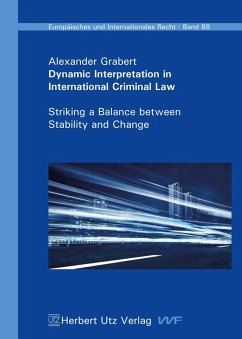The interpretive process in International Criminal Law (>ICL<) is characterised by a conflict between the requirements for stability and change. On the one hand, ICL provides for the >criminal< responsibility of individuals. Thus, there is an enhanced requirement for legal certainty: According to the principle of legality, the addressee of the law must be able to identify the prohibited conduct in advance in order to be able to avoid criminal sanctions. On the other hand, however, ICL forms part of >international< law. Hence, it derives to some extent from international treaties. Whereas the forms of criminal conduct are continuously evolving, treaties are rather static instruments - they cannot be adapted to a changing environment within a short period of time. Thus, reality is developing at a pace that the law cannot always match. In consequence, there is a certain need to account for evolving circumstances within the framework of interpretation. The aim of this book is to review the consequences of this conflict for the interpretation of ICL. How can the conflicting requirements be brought into balance? Can substantive rules of ICL be interpreted in a >dynamic< fashion to the detriment of the accused without violating the principle of legality? How do international criminal courts and tribunals deal with this issue?
Dieser Download kann aus rechtlichen Gründen nur mit Rechnungsadresse in A, B, BG, CY, CZ, D, DK, EW, E, FIN, F, GR, HR, H, IRL, I, LT, L, LR, M, NL, PL, P, R, S, SLO, SK ausgeliefert werden.









